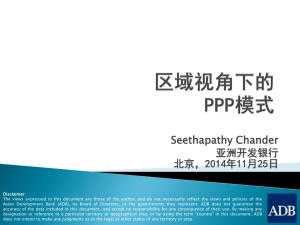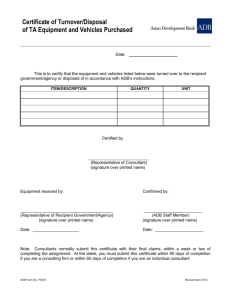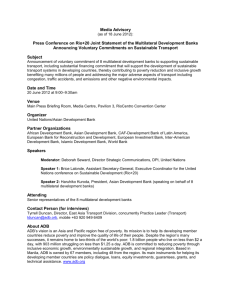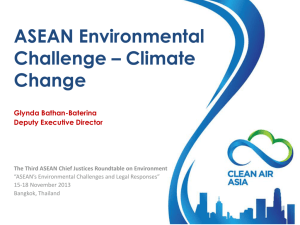ADB BUSINESS PROCESS Banking Operations
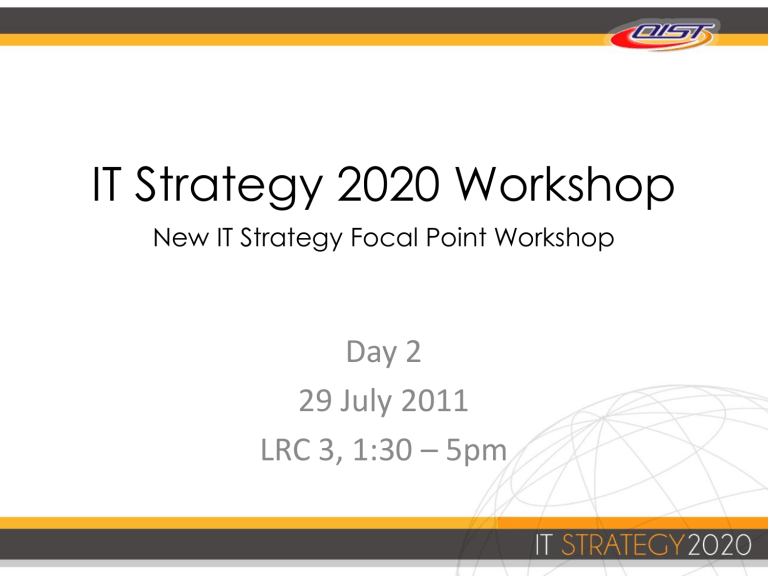
IT Strategy 2020 Workshop
New IT Strategy Focal Point Workshop
Day 2
29 July 2011
LRC 3, 1:30 – 5pm
Welcome Note
Post ISTS II Capability
Group Exercise Instruction
Group Exercise
Coffee Break
Group Exercise Presentation
Open Discussion
Closing Note
Agenda
Philip Erquiaga
Barbara Davis
Mikio Mukai
Group Leaders
Rajat Nag
Welcome Note
Philip Erquiaga
Director General, PSOD
Post-ISTS II Capability
Office of Information Systems and Technology
Barbara Davis
ADB
BUSINESS PROCESS
Banking Operations
eOperations for SO and NSO
Consultant Management System (CMS)
Procurement System (PRS)
GFIS, TAIS, LFIS -> P3M-Fin
CLASS
Corporate Operations
Credit Risk Management System (CRMS)
Treasury Risk Management System (TRMS)
ODS – EDB, ODB, & RDB
ADB Portal, eStar, eBoard, eOperations, BDS, etc.
Capital Subscription System -> Fund Accounting
Oracle AP, AR, SR, GL
Funding Management System (FMS)
Investment Management System (IMS)
Bank Transaction Processing System (BTPS)
Oracle HR, PDP, Various Benefit Systems
SHIPMON, eTrip, Various Service Mgt Systems
Oracle Procurement, Supplier Management System
Budget Mgt & Control System (BMCS) -> Budget System
Lotus Notes, Network, Business Continuity Facility
Group Exercise
IT Strategy 2020 Workshop Day 2
Mikio Mukai
Day 2 – Group Exercise Topics
Key questions Topic
1.
Operational Effectiveness
NSO & SO
ICT in sectors
Knowledge sharing
Data management
Regional integration
Co-finance
2.
Organizational Effectiveness
Corporate change management
Work program, budget, human resource
Strategy, policy, business rules changes
Employee Communication
Education & training
Organizational performance evaluation
How should ADB work in NO & NSO (or PPP) field in terms of process, information, data, documentation point of view? How should operation process and knowledge integrate together? How should ICT support in the sector development, especially strategic sectors in Strategy 2020? How should regional integration and country based operation marry? How should ADB main stream funding and co-finance be integrated?
How should ABD manage organizational changes from policy, strategy, business rules business process, resource requirements, skill set, training, IT investment, employee communication? How should ADB manage that policy level changes are implemented into the execution level? How work program and budget support organizational changes? How to retain consistency across the organization ?
3.
Partnership
External communication
Civil organization relationship management
Donor relationship management
Peer organization harmonization
Government interaction
Event participants
Complaints & Info request management
Anti Corruption
Accountability mechanism
4.
Good Governance
Geographic
Centralized vs de-centralized operation
Business continuity
Operation risk management
Security management
Data archive & record management
How should ADB retain various external communication history?
How should ADB manage different type of touch (contact) points?
How can ADB bring awareness of the importance of organizational memory rather individual memory? How can ADB avoid complaints including corruption and misplacement of requests?
How should ADB operate geographically? How should ADB balance centralized vs decentralized? How should ADB balance investment and business continuity from operational risk point of view? How should ADB manage various security (life , information etc)? How should ADB manage organizational data and record?
Dept/Office
RSDD
OREI
ERD
SERD
PARD
PSOD
OCO
SPD
IED
EARD
COSO
OGC
BPMSD
OSEC
OCRP
DER
OAI
OSPF
SARD
OAS
OAG
ORM
CWRD
CTL
TD
Day 2 Group Exercise Instruction
1. Please discuss topics within the group and develop business requirements list supporting IT capability and assuming organizational changes in the given template. Suggested (not necessarily limited to) view point for group exercise:
Consider timelines (e.g., immediate requirements, foreseeable requirements, or
transformational requirements ).
Think process rather than department or office.
Role-based rather than job-based.
Optimize end-to-end process rather than cross divisional process integration.
Geographic, work location.
Centralized vs decentralized issues.
Managed vs self-managed issues.
Etcetera…
2. Once business requirements are listed, please pick the top three business requirements and put them in the presentation form.
Day 2 Group Exercise Output Format
Please discuss topics within the group and develop business requirements list supporting IT capability and assuming organizational changes in the given template. Suggested (not necessarily limited to) view point for group exercise:
Colum Title Contents Guidance
#
BR Name
Description
IT Capability
Strategic Alignment
Priority
D2G1-001 etc describe Day, group, and list number
Provide short name of the business requirements
Brief description of business requirements
Brief IT capability support realization of business requirements
Describe relevant Strategy 2020 elements or any official
High, Medium, Low
Current State
Timing
Budgeted, Programmed (WPBF), Reported (in some form), First time
Immediate, mid term, and long term
Leading Dept/Office Department or office that should lead business requirements implementation
Type of Requirements Innovative, Efficiency improvement, Mandatory
Prerequisite/
Assumption
Prerequisite or assumption if require to implement such a business requirements
Group Presentation
IT Strategy 2020 Workshop Day 2
Open Discussion
IT Strategy 2020 Workshop Day 2
Closing Note
Rajat Nag
Managing Director General, OPR
Thank You!
IT Strategy 2020 Workshop Day 2
